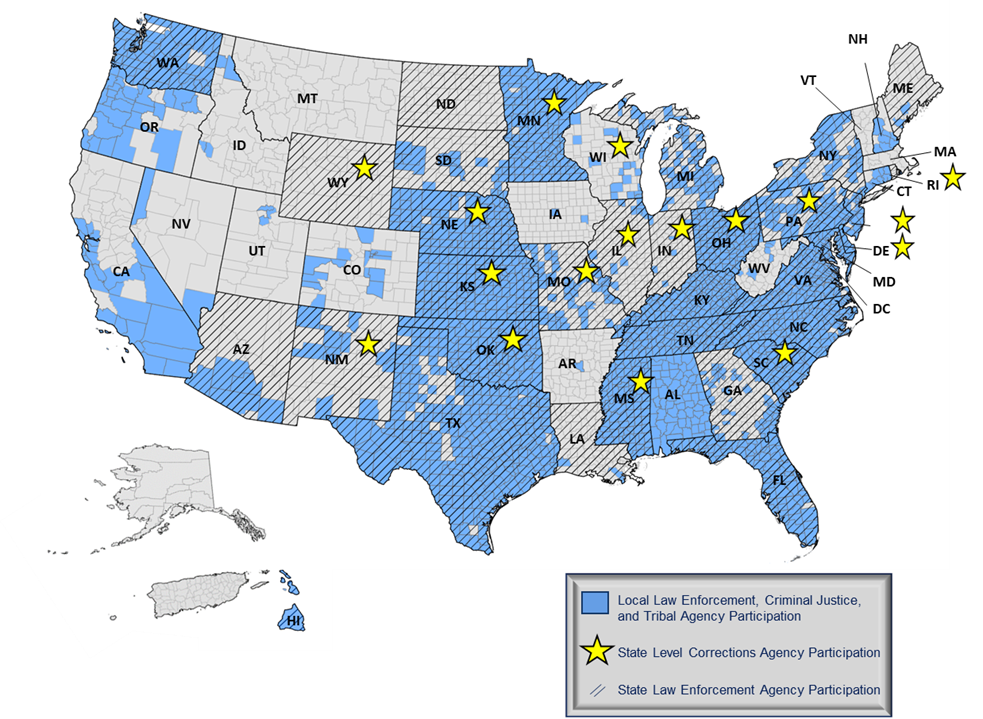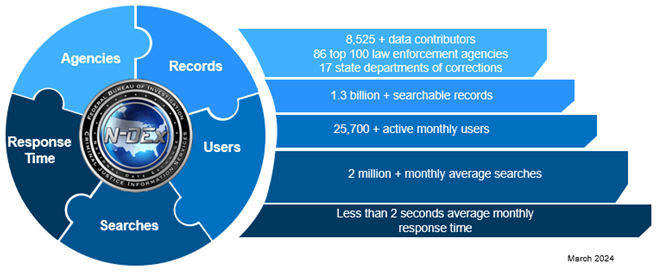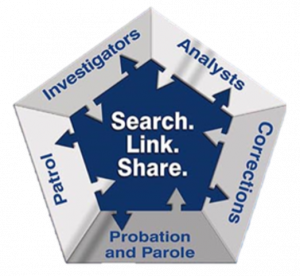Summit Art Creations/stock.adobe.com
 |
 |
Picture this: Law enforcement officers are working on a double homicide case and identify two suspects—a mother and son. But, while they were investigating the suspects, the mother fled the area, and the officers do not know her current location. She may be down the road, in a neighboring state, or across the country. How are they going to find her?
Imagine if the officers could use one database to search the mother’s name and find her most recent residential address. Then, they could enter that address into the same database and find an incident report filed by a police department hundreds of miles away in another state. It would be a no-brainer to use that database to access those critical pieces of information to arrest a potential murderer, would it not? That is exactly what an officer in Tennessee did.
N-DEx: A Valuable Criminal Justice Information Sharing System
The valuable database that held the mother’s current residential address and the incident report from a police department in another state is the FBI’s National Data Exchange (N-DEx) System. It contains more than 1 billion (yes, a billion!) searchable criminal justice records from law enforcement agencies across the United States, including federal agencies. So, it is likely that the N-DEx System contains information that could add value to many law enforcement investigations. Members of federal, state, local, tribal, and territorial criminal justice agencies can access the N-DEx System at any time to search and analyze data and identify links among persons of interest, crimes, and other investigations.
| Federal Contributors to N-DEx System |
|---|
N-DEx users have access to federal data from the following contributors:
|
The FBI’s Criminal Justice Information Services (CJIS) Division created the N-DEx System in 2008 in response to the 9/11 Commission Report, which called for more information sharing between federal, state, and local law enforcement agencies. The N-DEx System is just one of many criminal justice services managed by the CJIS Division; other services include the National Crime Information Center (NCIC), the Next Generation Identification (NGI) System, and the National Instant Criminal Background Check System (NICS). The CJIS Division provides various tools and services to help law enforcement stay safe while investigating crimes.
The N-DEx System facilitates information sharing among law enforcement agencies and the criminal justice community. Since the N-DEx System became operational in 2012, thousands of law enforcement agencies have contributed more than 1 billion records to the N-DEx System to share with their criminal justice partners across the United States. The records that law enforcement agencies contribute to the N-DEx System span the entire criminal justice lifecycle and include the following:
-
- Arrest reports
- Booking and incarceration reports
- Citations/tickets
- Field contacts/interviews
- Incident and case reports
- Missing persons reports
- Pre-trial, probation, and parole reports
- Service calls
- Warrants
Sharing these records allows members of the criminal justice community to search, analyze, and connect numerous records across jurisdictions and systems, providing law enforcement with even more information for their investigations. Participating in N-DEx is a mutually beneficial partnership between law enforcement agencies—the more agencies that share their information, the greater the repository is for searches, which could benefit many law enforcement investigations. It can help piece together seemingly unrelated information and show the bigger picture of how multiple elements are connected. It can provide missing and unforeseen details. And it can promote partnership and collaboration between agencies.
 |
| Through the N-DEx System, law enforcement agencies can support each other and collaborate to bring justice and safety to the public. |
The N-DEx System Connects Agencies Across the United States
Benefits of Using the N-DEx System |
|---|

|
|
— N-DEx is a secure system and contains more than 1 billion criminal justice records to assist law enforcement personnel as much as possible. |
With information sharing at its core, the N-DEx System enables law enforcement personnel to assist each other with cases from thousands of miles away. This was exemplified in the double homicide case previously referenced in which law enforcement in Tennessee received a lead in their case because law enforcement in Texas entered records into the N-DEx System. The case involved officers with a Tennessee sheriff’s department investigating the deaths of two male victims who had died from gunshot wounds. The officers identified two suspects, mother and son, but the mother fled the area during the investigation. Fortunately, after the officer realized the mother was on the lam, one of the first systems the officer searched was the N-DEx System.
Upon receiving indictments, the officer searched the N-DEx System for more information on the mother. The officer found an incident report from a police department in Texas regarding a recent situation involving the mother. This report detailed the situation and revealed the mother’s recent residential address—the case-breaking information that the Tennessee department needed to locate the mother. The Tennessee department contacted the Texas agency, and they exchanged information. The Texas agency located and arrested the mother, and the Tennessee department extradited her back to their jurisdiction. Both subjects—the mother and son—were arrested, convicted, and sentenced to two life sentences each.
Officers with the two law enforcement agencies more than 700 miles apart do not typically cross paths, but their work did in this instance because of the N-DEx System. This success story demonstrates how using the N-DEx System could be the difference between making an arrest or not, between an alleged murderer roaming free or being located, arrested, and sentenced. Their effective use of the N-DEx System earned the Tennessee sheriff’s department the 2023 N-DEx Success Story of the Year award.
This collaboration is not a rare coincidence. The N-DEx System regularly connects agencies in disparate regions of the United States and enables them to work together to solve cases. Criminals, persons of interest, missing persons, and others may move from area to area and cross state lines. This movement can result in multiple incident reports from different states and jurisdictions. However, those reports may not be available to law enforcement across the various jurisdictions, possibly due to having separate systems. To close this gap, agencies need to be able to search all available U.S. criminal justice records regarding their persons of interest. Fortunately, the N-DEx System allows law enforcement to search for individuals across jurisdictional boundaries.
Contributing Data to the N-DEx System Maximizes Benefits
As the Tennessee and Texas agencies demonstrate, it is just as important to contribute records to the N-DEx System as it is to search the N-DEx System. If the Texas agency had chosen not to share their criminal justice records in the N-DEx System, the Texas law enforcement may not have discovered that a suspected murderer was within their area of responsibility. And, if the Tennessee agency had not searched the N-DEx System for their subject, the Tennessee officers may not have found her current address, and a murder suspect could have remained free. Information sharing is vital—and potentially lifesaving. Sharing information through the N-DEx System can benefit the entire criminal justice community.

As the U.S. map shows, law enforcement’s participation in the N-DEx System varies by state and county. Blue shading, stars, and diagonal stripes indicate some level of participation, either at the state or local level. Some states have only one county participating in the N-DEx System, whereas other states—such as Kansas, Mississippi, and Ohio—have 100 percent participation, including full participation at the state level. To make the database the most advantageous for the criminal justice community, law enforcement agencies in all counties in all states should contribute records to the N-DEx System. States fully participating in the N-DEx System help law enforcement from all over the country do their jobs accurately, efficiently, and safely.
As of March 2024, more than 8,500 criminal justice agencies have contributed more than 1 billion searchable records to the N-DEx System since it became operational in 2012. More than 25,000 active users execute an average of 2 million searches every month—that is about 46 searches per minute. And these searches return results quickly. In less than two seconds, users can have valuable information right at their fingertips.

N-DEx Feature: Batch Search
In addition to its fast response rate, the N-DEx System includes the Batch Search feature, which allows users to conduct thousands of searches simultaneously. This feature helps law enforcement and criminal justice personnel do their jobs more efficiently. With Batch Search, users can search multiple names, phone numbers, or vehicles at the same time. Users can also set subscriptions to run specified batch searches every day, week, or month and receive automatic alerts when new results are found. The Batch Search feature can assist with the following operations:
-
- Fugitive apprehensions
- Missing persons investigations
- Community supervision
- Support joint operatives
- Complex or large-scale operations
- Sexual offender registry violations
Alert and notification capabilities can save N-DEx users even more valuable time. Within the Batch Search feature, users can automatically receive notifications when new records are added into the N-DEx System and when other users conduct a search with the same criteria. These capabilities aid users with staying up to date on important elements of their investigations, such as subjects’ locations, accomplices, vehicles, etc., and promote connections and collaboration between agencies, which is the epitome of the N-DEx System.

The N-DEx System Can Provide Unforeseen Connections
Having access to more than 1 billion records from thousands of law enforcement agencies makes the N-DEx System a force multiplier. But this robust system is not only for investigators—analysts, corrections personnel, detectives, parole and probation officers, and regional dispatchers can also search the N-DEx System for relevant information.

In one instance, a crime analyst with a police department searched a suspect’s phone number in the N-DEx System, after seemingly hitting a dead end. The N-DEx search returned a record that provided more information related to the suspect, including a criminal history. This additional information allowed law enforcement officers to confirm the subject’s identity and arrest the subject.
With agencies from all over the United States sharing their criminal justice records in the N-DEx System, law enforcement from different states can provide each other with a wide array of data. One N-DEx user conducted a subject search and found crucial information in a record from another state’s police department. The record was a few years old, but it established proof of association between the user’s subject and a potential accomplice by having both names on the same record. This record was essential to the user’s case.
 |
| Each hand represents an agency that could have a critical piece of information for an investigation. The N-DEx System can help law enforcement personnel discover those pieces and bring them together to see the whole picture. |
|
“N-DEx is a great tool when all of the standard practices have been exhausted. It really captures the ability to get to information on the periphery, and deep dive into the extra case information once the big ideas didn’t yield any results. I would classify it as a treasure trove of random, but extremely helpful information to give new leads to my cases using state, local, and federal data that isn’t culminated anywhere else in one place. After utilizing all the standard systems and protocols, it gives me hope that we’re not quite through yet. I have solved many cases now with N-DEx information that I wasn’t able to locate anywhere else, even after I had found it in N-DEx. It’s just another tool in the toolbelt, but it’s highly underutilized, and a breadth of information.” —Bryan, FBI’s Laboratory Division |
In addition to linking information, the N-DEx System can provide missing information for unknown individuals or individuals with unknown identifiers. For example, if a victim of a crime knows only a suspect’s name and state of residence, an N-DEx user can search for that information in the N-DEx System to obtain more of the suspect’s identifiers. With the additional identifiers, the user can conduct another N-DEx search to find even more information about the suspect, such as residential address, criminal history, potential accomplices, etc. This cycle can continue until the user has all the available information for the case.
The N-DEx System enhances supervision efforts, provides situational awareness, solves cases, and more. Searching the N-DEx System can mean the difference between solving crimes and investigations being stalled or finding a fugitive and a subject remaining elusive. The N-DEx System has an abundance of information, but to maximize its usefulness across the criminal justice community, it needs more criminal justice records from more agencies. Participation is vital to helping law enforcement solve cases.
Accessing and Contributing Data to N-DEx
|
Law enforcement and criminal justice personnel can access the N-DEx System on the web, at any time, and at no cost. The N-DEx System can be accessed through the Law Enforcement Enterprise Portal (LEEP), Regional Information Sharing Systems (RISS), Law Enforcement Information Exchange (LInX), and other secure connection options.
Individuals without a LEEP account can request one at www.cjis.gov. Individuals with a LEEP account can login to LEEP and search “National Data Exchange System” in the Services search bar. Instructions to request access will appear next to the N-DEx icon. Once access is approved, the N-DEx icon will appear in the user’s LEEP Services list.

The N-DEx Program Office has experts who can provide agencies with technical assistance for accessing and/or contributing data to the N-DEx System. These experts work with agencies for free to submit their data.
For assistance with access or data contribution, law enforcement and criminal justice personnel can contact N-DEx staff via email at ndex@leo.gov. For more information about the N-DEx System, scan the QR code or visit fbi.gov/ndex. 🛡
Please cite as
McKenna Atha, “Connect the Dots with FBI’s N-Dex,” Police Chief Online, August 22, 2024.




